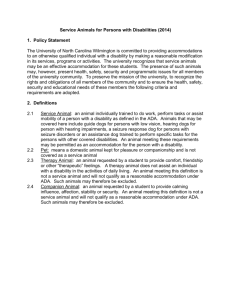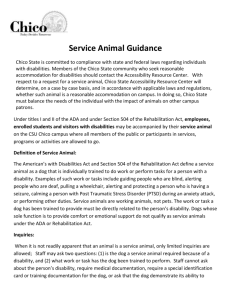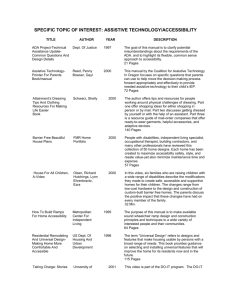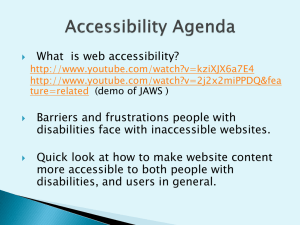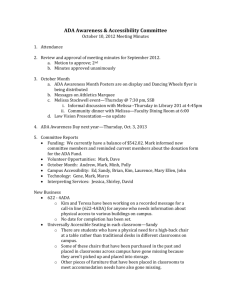Service Animal Policy - California State University, East Bay
advertisement
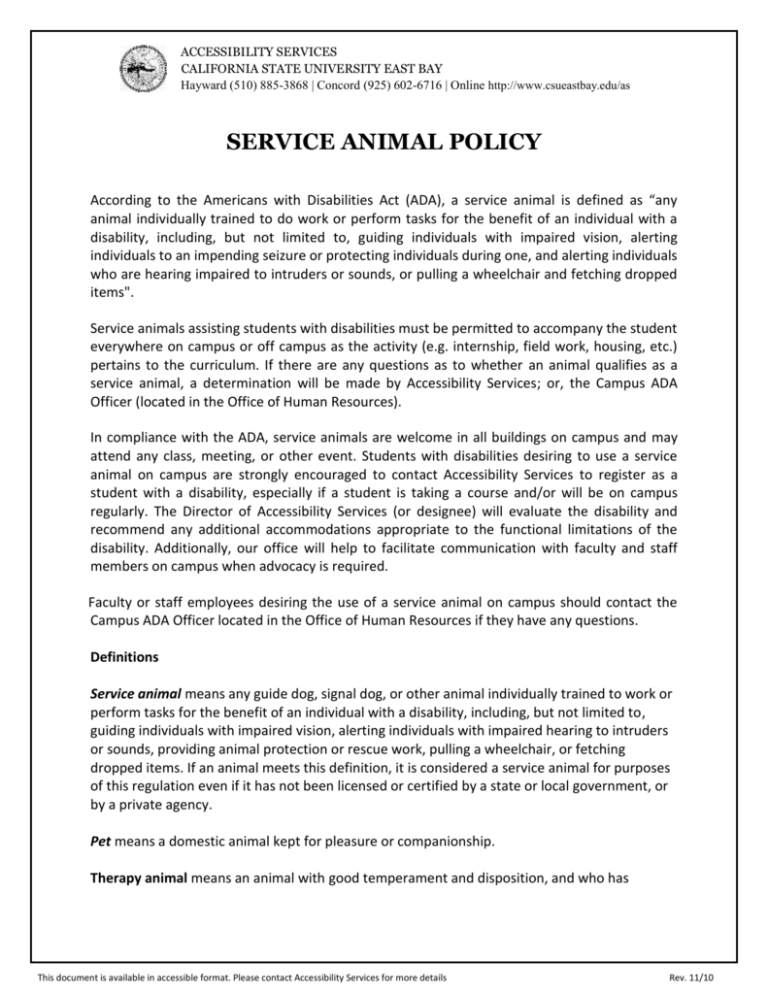
ACCESSIBILITY SERVICES CALIFORNIA STATE UNIVERSITY EAST BAY Hayward (510) 885-3868 | Concord (925) 602-6716 | Online http://www.csueastbay.edu/as SERVICE ANIMAL POLICY According to the Americans with Disabilities Act (ADA), a service animal is defined as “any animal individually trained to do work or perform tasks for the benefit of an individual with a disability, including, but not limited to, guiding individuals with impaired vision, alerting individuals to an impending seizure or protecting individuals during one, and alerting individuals who are hearing impaired to intruders or sounds, or pulling a wheelchair and fetching dropped items". Service animals assisting students with disabilities must be permitted to accompany the student everywhere on campus or off campus as the activity (e.g. internship, field work, housing, etc.) pertains to the curriculum. If there are any questions as to whether an animal qualifies as a service animal, a determination will be made by Accessibility Services; or, the Campus ADA Officer (located in the Office of Human Resources). In compliance with the ADA, service animals are welcome in all buildings on campus and may attend any class, meeting, or other event. Students with disabilities desiring to use a service animal on campus are strongly encouraged to contact Accessibility Services to register as a student with a disability, especially if a student is taking a course and/or will be on campus regularly. The Director of Accessibility Services (or designee) will evaluate the disability and recommend any additional accommodations appropriate to the functional limitations of the disability. Additionally, our office will help to facilitate communication with faculty and staff members on campus when advocacy is required. Faculty or staff employees desiring the use of a service animal on campus should contact the Campus ADA Officer located in the Office of Human Resources if they have any questions. Definitions Service animal means any guide dog, signal dog, or other animal individually trained to work or perform tasks for the benefit of an individual with a disability, including, but not limited to, guiding individuals with impaired vision, alerting individuals with impaired hearing to intruders or sounds, providing animal protection or rescue work, pulling a wheelchair, or fetching dropped items. If an animal meets this definition, it is considered a service animal for purposes of this regulation even if it has not been licensed or certified by a state or local government, or by a private agency. Pet means a domestic animal kept for pleasure or companionship. Therapy animal means an animal with good temperament and disposition, and who has This document is available in accessible format. Please contact Accessibility Services for more details Rev. 11/10 ACCESSIBILITY SERVICES CALIFORNIA STATE UNIVERSITY EAST BAY Hayward (510) 885-3868 | Concord (925) 602-6716 | Online http://www.csueastbay.edu/as reliable, predictable behavior, selected to accompany people with disabilities. The animal may be incorporated as an integral part of a treatment process. A therapy animal does not assist an individual with a disability in the activities of daily living. The therapy animal does not accompany a person with a disability at all times, unlike a service animal that is always with a person with a disability. A therapy animal is not considered to be a service animal under this regulation or other disability law. Requirements of Service Animals and Their Owners Include: 1. Dogs must be licensed in accordance with county regulations and wear a vaccination tag. 2. Other types of animals must have vaccinations appropriate for that type of animal. 3. Animals must be in good health. Animals to be housed in university housing must have an annual clean bill of health from a licensed veterinarian. 4. A service animal shall have a harness, leash, or other tether, unless either the handler is unable because of a disability. 5. The owner must be in full control of the animal at all times. 6. The owner is encouraged to provide the appropriate University office (Accessibility Services, Human Resources and the ADA Officer) with information about their service animal usage in order to enable these offices to support their use; and, to be able to respond to any concerns that may arise. Reasonable behavior is expected from service animals while on campus. If a service dog, for example, exhibits unacceptable behavior, the owner is expected to employ the proper training techniques to correct the situation. The owners of disruptive and aggressive service animals may be asked to remove them from university facilities. If the improper behavior happens repeatedly, the owner may be told not to bring the service animal into any facility until they take significant steps to mitigate the behavior. This mitigation may include muzzling a barking dog, or refresher training for the animal and its owner. Cleanliness of the service animal is mandatory. Daily grooming and occasional baths (at a vet or a family home) should keep dog odor to a minimum. Flea control is essential and adequate preventative measures should be taken. If a flea problem develops, it should be dealt with immediately and in an effective manner. Consideration of others must be taken into account when providing maintenance and hygiene of service animals. This document is available in accessible format. Please contact Accessibility Services for more details Rev. 11/10 ACCESSIBILITY SERVICES CALIFORNIA STATE UNIVERSITY EAST BAY Hayward (510) 885-3868 | Concord (925) 602-6716 | Online http://www.csueastbay.edu/as Areas Restricted to Service Animals The University may prohibit the use of service animals in certain locations due to health or safety restrictions, where service animals may be in danger, or where their use may compromise the integrity of certain research. Such restricted locations include, but are not limited to, food preparation areas, certain research laboratories, mechanical rooms/custodial closets, wood/metal/machine shops, classrooms with demonstration/research animals, areas where protective clothing is necessary, and/or other areas where the animal's presence may constitute a danger or a fundamental alteration of the program or activity conducted in the area. Access to restricted areas may be granted on a case-by-case basis by contacting Accessibility Services or the ADA Officer. The university will pursue an interactive process to determine whether or not admission of the service animal will be granted or denied. Removal of Service Animals The university has the authority to remove a service animal from its grounds or facilities if the service animal becomes unruly or disruptive, unclean, and/or unhealthy to the extent that the animal's behavior or condition poses a direct threat to the health or safety of others or otherwise causes a fundamental alteration in the university's services, programs, or activities. If such behavior or condition persists, the owner may be directed not to bring the animal into public campus areas until the problem is rectified. Miniature Horses Accessibility Services shall make reasonable modifications in policies, practices, or procedures to permit the use of a miniature horse by an individual with a disability if the miniature horse has been individually trained to do work or perform tasks for the benefit of the individual with a disability. In determining whether reasonable modifications in policies, practices, or procedures can be made to allow a miniature horse into a specific facility, the following will be considered: 1. The type, size, and weight of the miniature horse and whether the facility can accommodate these features; 2. Whether the handler has sufficient control of the miniature horse; 3. Whether the miniature horse is housebroken; and 4. Whether the miniature horse's presence in a specific facility compromises legitimate safety requirements that are necessary for safe operation. Other basic requirements apply to service animals, shall also apply to miniature horses. Conflicting Disabilities If another person on campus has a covered disability under the ADA and it includes an allergic reaction or any other documented disability related to animals, and that person has contact with a service animal approved for presence on campus, a request for assistance will be made This document is available in accessible format. Please contact Accessibility Services for more details Rev. 11/10 ACCESSIBILITY SERVICES CALIFORNIA STATE UNIVERSITY EAST BAY Hayward (510) 885-3868 | Concord (925) 602-6716 | Online http://www.csueastbay.edu/as to Accessibility Services and/or ADA Officer who will consider all facts surrounding the contact and make an effort to resolve the issue. Appeal Procedure In the event of a dispute about an accommodation relating to a service animal, or an animal restriction, a complaining party, who is a member of the university community (i.e. student, EPA employee, SPA employee, etc.) may file a formal grievance with the campus ADA Officer – Linda Nolan (510) 885-4918. For More Information Any questions regarding this policy may be directed to either Accessibility Services - LI 2400 (510) 885-3868, or to the ADA Officer, Linda Nolan - (510) 885-4918. This document is available in accessible format. Please contact Accessibility Services for more details Rev. 11/10
